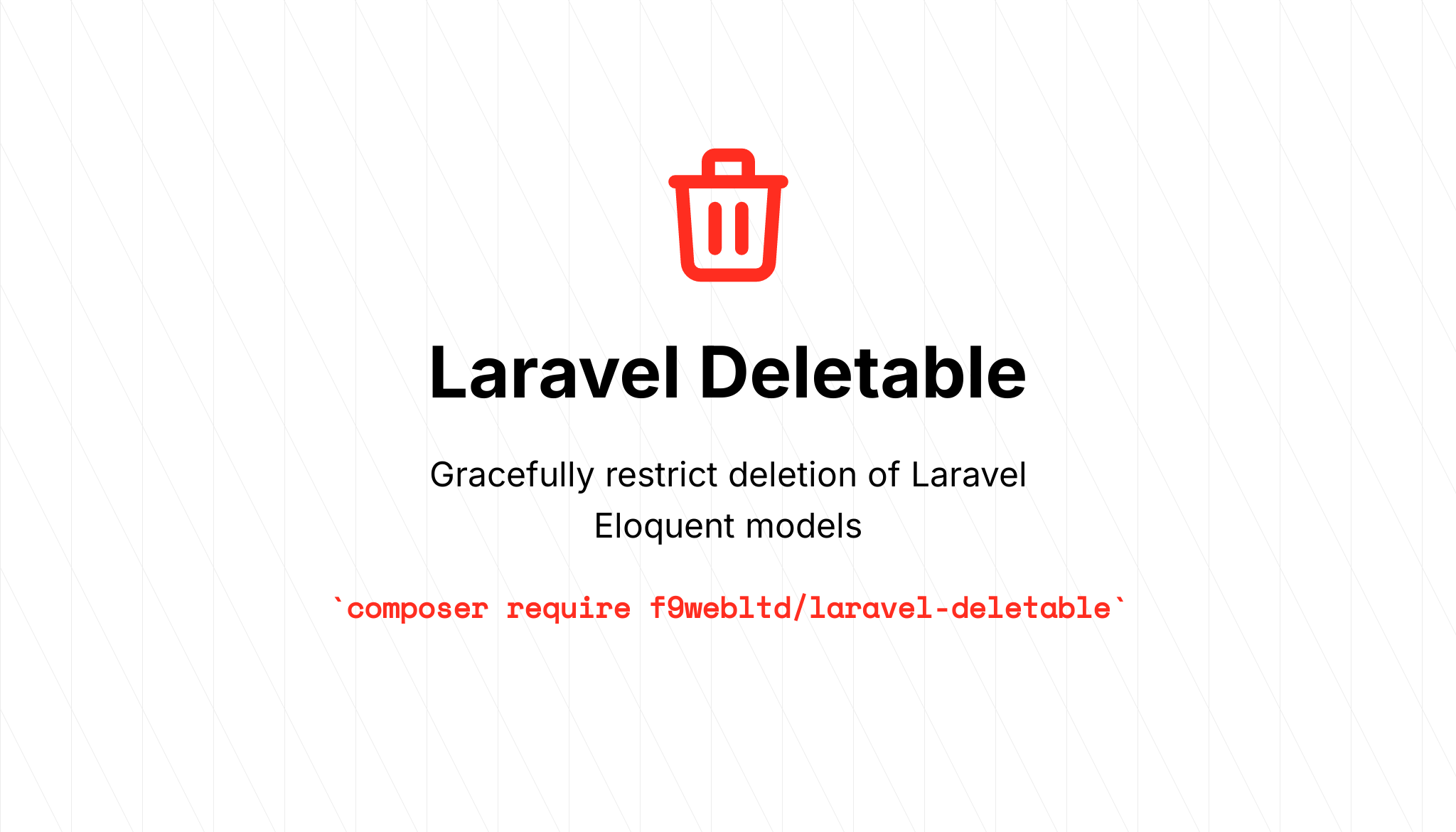| Package Data | |
|---|---|
| Maintainer Username: | ultrono |
| Maintainer Contact: | rob@f9web.co.uk (Rob Allport) |
| Package Create Date: | 2020-07-10 |
| Package Last Update: | 2025-02-24 |
| Home Page: | |
| Language: | PHP |
| License: | MIT |
| Last Refreshed: | 2026-02-11 03:00:26 |
| Package Statistics | |
|---|---|
| Total Downloads: | 68,213 |
| Monthly Downloads: | 1,848 |
| Daily Downloads: | 83 |
| Total Stars: | 158 |
| Total Watchers: | 1 |
| Total Forks: | 8 |
| Total Open Issues: | 2 |

Gracefully handle deletion restrictions on your Eloquent models, as featured on Laravel News
^8.2
^10.0 / ^11.0.For older versions of PHP / Laravel use version 1.0.6
composer require f9webltd/laravel-deletable
The package will automatically register itself.
Optionally publish the configuration file by running: php artisan vendor:publish and selecting the appropriate package.
Within an Eloquent model use the RestrictsDeletion trait:
namespace App;
use F9Web\LaravelDeletable\Traits\RestrictsDeletion;
use Illuminate\Database\Eloquent\Model;
class User extends Model
{
use RestrictsDeletion;
}
The trait overrides calls to Eloquent's delete() method.
Implement the isDeletable() method within the model in question.
This method should return true to allow deletion and false to deny deletion:
namespace App;
use F9Web\LaravelDeletable\Traits\RestrictsDeletion;
use Illuminate\Database\Eloquent\Model;
class User extends Model
{
use RestrictsDeletion;
public function isDeletable() : bool
{
return $this->orders()->doesntExist();
}
}
The above denies deletion of users with orders.
None deletable models throw an exception when the isDeletable() method returns false:
namespace App\Controllers;
use F9Web\LaravelDeletable\Exceptions\NoneDeletableModel;
use App\User;
class UsersController
{
public function destroy(User $user) : bool
{
try {
$user->delete();
} catch (NoneDeletableModel $e) {
// dd($ex->getMessage());
}
}
}
As the default isDeletable() method returns true, a base Eloquent model can be optionally defined from which all models extend. Each model can then optionally implement the isDeletable() method as needed.
The default exception message is defined within the config f9web-laravel-deletable.messages.default and is simply The model cannot be deleted.
By setting f9web-laravel-deletable.messages.default to null a more detailed message is automatically generated i.e. Restricted deletion: App\User - 1 is not deletable.
Custom messages can be set within the isDeletable() method:
namespace App;
use F9Web\LaravelDeletable\Traits\RestrictsDeletion;
use Illuminate\Database\Eloquent\Model;
use Illuminate\Support\Str;
class User extends Model
{
use RestrictsDeletion;
public function isDeletable() : bool
{
if (Str::endsWith($this->email, 'f9web.co.uk')) {
return $this->denyDeletionReason('Users with f9web.co.uk company email addresses cannot be deleted');
}
return true;
}
}
The denyDeletionReason() method can be used to specify the exception message.
In the above case, the exception message is Users with f9web.co.uk company email addresses cannot be deleted.
Multiple checks can be performed within isDeletable() if necessary, each of which returning a different exception message:
namespace App;
use F9Web\LaravelDeletable\Traits\RestrictsDeletion;
use Illuminate\Database\Eloquent\Model;
use Illuminate\Support\Str;
class User extends Model
{
use RestrictsDeletion;
public function isDeletable() : bool
{
if (Str::endsWith($this->email, 'f9web.co.uk')) {
return $this->denyDeletionReason('Users with f9web.co.uk company email addresses cannot be deleted');
}
if ($this->orders->isNotEmpty()) {
return false;
}
if ($this->purchaseOrders->isNotEmpty()) {
return $this->denyDeletionReason('This user has active purchase orders and cannot be deleted');
}
if ($this->overdueInvoices->isNotEmpty()) {
return $this->denyDeletionReason('Users with overdue invoices cannot be deleted');
}
return true;
}
}
Any ideas are welcome. Feel free to submit any issues or pull requests.
composer test
If you discover any security related issues, please email rob@f9web.co.uk instead of using the issue tracker.
The MIT License (MIT). Please see License File for more information.